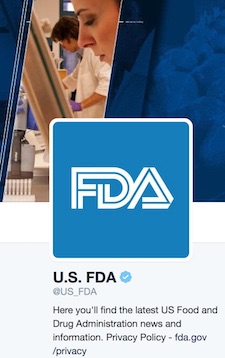 The Food and Drug Administration plans to re-evaluate its official definition of what constitutes "healthy" food. An update to that agency's meaning of the term could have a direct effect on how food companies today market their products.
The Food and Drug Administration plans to re-evaluate its official definition of what constitutes "healthy" food. An update to that agency's meaning of the term could have a direct effect on how food companies today market their products.
The decision to revisit the definition, which has not been updated since the 1990s, comes as the FDA is expected to issue its final revised updates to the Nutrition Facts label found on most food packages later this year.
The agency seeks to update the Nutrition Facts label to make it more consistent with new scientific information, as well as the updated dietary guidelines released by the USDA in January. That government policy statement scaled back previous recommendations on dietary cholesterol and accounted for an updated scientific distinction between healthy fats — such as nuts — from regular fats. The updated dietary guidelines also shifted its focus to account for overall eating patterns, emphasizing food choices in the context of the patterns in which they are consumed, versus simply listing foods that Americans should avoid or eat more of.
Discrepancies between the FDA’s current definition of “healthy,” compared to recent scientific findings and the USDA's newest dietary guidelines, have become a source of confusion. One example is the avocado, which is now considered a super food, though it remains considered “unhealthy” according to the FDA’s definition, due solely to its total fat content.
Currently, the FDA allows food brands to market their product as "healthy" only if it meets the agency’s nutrient content criteria requirements, which largely places an emphasis on fats, cholesterol and sodium. That strict — and arguably, dated — criteria made headlines last year, when popular granola bar maker Kind was served with an FDA warning letter for labeling its snacks as "healthy," a term the agency said didn’t meet the FDA’s requirements that govern the use of that claim. The company responded, stating its use of the word "healthy" was apt, as the product’s fat content is derived from nuts, a food now recommended in the latest USDA dietary guidelines. The FDA later agreed to allow Kind to continue use of the word “healthy” as a sort of broad, philosophical claim about the company, if not its food products.
Kind in February hired public affairs powerhouse Glover Park Group for lobbying help on FDA issues.
“I think [the FDA] realized they were caught out by this, and they needed to rethink their standards and do something about the facts that the Kind case brought out,” said E. Melanie DuPuis, a professor and chair of environmental studies and science at Pace University.
DuPuis, who is also author of Dangerous Digestion: The Politics of American Dietary Advice, told O’Dwyer’s that the notion of a new definition for "healthy" opens a potential Pandora’s box for food marketers, because like all industries, they rely on processes they want to keep stable, and when the definition of a term they use starts changing, companies have to change those processes.
“The only thing worse than regulations for an industry are regulations that are constantly changing,” DuPuis said.
Bill Layden, partner and co-founder of food, nutrition and wellness agency FoodMinds, told O’Dwyer’s that the FDA's decision to re-examine its current definition of the term is "long overdue,” and said the move would open up opportunities for food and beverage companies to review labeling and align their products with current dietary guidelines.
“It could be a tremendous help in informing consumers,” Layden said.
The FDA now plans to solicit comment from the public as well as food experts on the issue of what constitutes "healthy" food. That process could take several years.
"The question is, how do you create standards when there's no way we're all going to come up with a final, perfect definition of ‘healthy?’” DuPuis said. “We're always going to understand the science better than we did before, but we might also come up with new criteria regarding what we consider healthy, so what do we do about that? How do you come up with a process by which the standards can have flexibility as we learn more and as we change what we consider healthy? One way or another, I don’t think we're going to come up with a perfect solution, but having a public conversation about this stuff might be a good idea at this point.”
The news comes as the agency also prepares to update its definition for the word "natural," as it relates to the term’s popular use on food product labeling. The phrase has resulted in several high profile lawsuits, notably against retailer Whole Foods, due to claims that the grocer allegedly misled consumers into buying products that contained “non-natural” ingredients.
The FDA has sought public input on the use and appropriate definition of that term as well.
“Science is a journey, not a destination, so we have to periodically update information as we come to a better understanding of science,” Layden said. “Unfortunately, it’s just taken the FDA an incredibly long time to do it.”


 What the biggest meal of the day can teach us about serving up effective nutrition communications campaigns.
What the biggest meal of the day can teach us about serving up effective nutrition communications campaigns. Tips to refine and amplify your CPG brand strategy to win in 2024 and beyond.
Tips to refine and amplify your CPG brand strategy to win in 2024 and beyond. Strategic communications strategies for success in the growing “food is medicine” movement.
Strategic communications strategies for success in the growing “food is medicine” movement. How brands can authentically communicate sustainability issues and create a brand experience that’s compatible with consumers’ values.
How brands can authentically communicate sustainability issues and create a brand experience that’s compatible with consumers’ values. Communicating the effects that climate change and a growing world population have on our food system—and why change is needed.
Communicating the effects that climate change and a growing world population have on our food system—and why change is needed.


 Have a comment? Send it to
Have a comment? Send it to 
No comments have been submitted for this story yet.